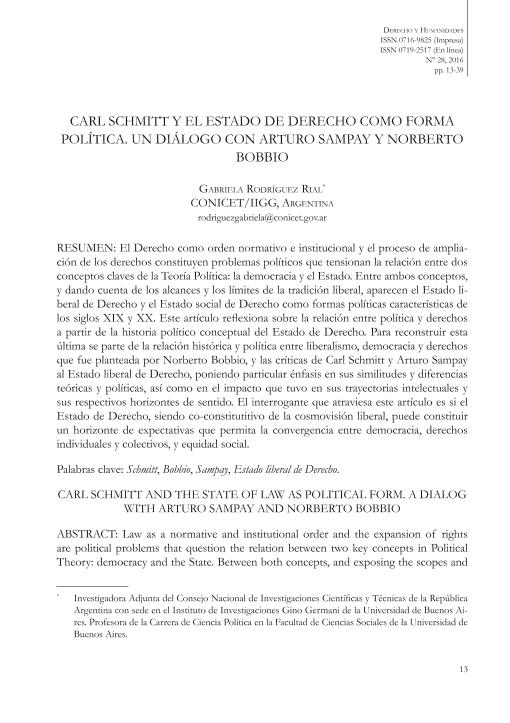Mostrar el registro sencillo del ítem
dc.contributor.author
Rodriguez, Gabriela

dc.date.available
2019-09-10T14:05:42Z
dc.date.issued
2016-12
dc.identifier.citation
Rodriguez, Gabriela; Carl Schmitt y el Estado de Derecho como forma política: Un diálogo con Arturo Sampay y Norberto Bobbio; Universidad de Chile. Facultad de Derecho; Derecho y Humanidades; 28; 12-2016; 13-39
dc.identifier.issn
0716-9825
dc.identifier.uri
http://hdl.handle.net/11336/83228
dc.description.abstract
El Derecho como orden normativo e institucional y el proceso de ampliación de los derechos constituyen problemas políticos que tensionan la relación entre dos conceptos claves de la Teoría Política: la democracia y el Estado. Entre ambos conceptos, y dando cuenta de los alcances y los límites de la tradición liberal, aparecen el Estado liberal de Derecho y el Estado social de Derecho como formas políticas características de los siglos XIX y XX. Este artículo reflexiona sobre la relación entre política y derechos a partir de la historia político conceptual del Estado de Derecho. Para reconstruir esta última, se parte de la relación histórica y política entre liberalismo, democracia y derechos que fue planteada por Norberto Bobbio, y las críticas de Carl Schmitt y Arturo Sampay al Estado liberal de Derecho, poniendo particular énfasis en sus similitudes y diferencias teóricas y políticas, así como en el impacto que tuvo en sus trayectorias intelectuales y sus respectivos horizontes de sentido. El interrogante que atraviesa este artículo es si el Estado de Derecho, siendo co-constitutitivo de la cosmovisión liberal, puede constituir un horizonte de expectativas que permita la convergencia entre democracia, derechos individuales y colectivos, y equidad social.
dc.description.abstract
Law as a normative and institutional order and the expansion of rights are political problems that question the relation between two key concepts in Political Theory: democracy and the State. Between both concepts, and exposing the scopes and limitations of the liberal tradition, there arise the Liberal State of Law and the Social State of Law as the two main political forms of the 19th and 20th centuries. The aim of this article is to reflect on the relationship between politics and rights by tracing the political and conceptual history of the State of Law. In order to reconstruct the latter, we start from the historical and political relationship between liberalism, democracy and rights established by Norberto Bobbio, and Carl Schmitt and Arturo Sampay’s criticism against the Liberal State of Law. We seek to emphasize their theoretical and political differences and similarities, as well as their impact on the authors’ intellectual paths and horizons of meaning. The question that motivates this article is whether the State of Law, as a co-constitutive element of the liberal world-view, can become a horizon of expectation where democracy, individual and collective rights and social equity can converge.
dc.format
application/pdf
dc.language.iso
spa
dc.publisher
Universidad de Chile. Facultad de Derecho
dc.rights
info:eu-repo/semantics/openAccess
dc.rights.uri
https://creativecommons.org/licenses/by-nc-sa/2.5/ar/
dc.subject
Schmitt
dc.subject
Estado de Derecho
dc.subject
Bobbio
dc.subject
Sampay
dc.subject.classification
Otras Ciencia Política

dc.subject.classification
Ciencia Política

dc.subject.classification
CIENCIAS SOCIALES

dc.title
Carl Schmitt y el Estado de Derecho como forma política: Un diálogo con Arturo Sampay y Norberto Bobbio
dc.title
Carl schmitt and the state of law as political form: A dialog with Arturo Sampay and Norberto Bobbio
dc.type
info:eu-repo/semantics/article
dc.type
info:ar-repo/semantics/artículo
dc.type
info:eu-repo/semantics/publishedVersion
dc.date.updated
2019-06-10T20:22:21Z
dc.identifier.eissn
0719-2517
dc.journal.number
28
dc.journal.pagination
13-39
dc.journal.pais
Chile

dc.journal.ciudad
Santiago de Chile
dc.description.fil
Fil: Rodriguez, Gabriela. Consejo Nacional de Investigaciones Científicas y Técnicas; Argentina. Universidad de Buenos Aires. Facultad de Ciencias Sociales. Carrera de Ciencia Politíca; Argentina. Universidad de Buenos Aires. Facultad de Ciencias Sociales. Instituto de Investigaciones "Gino Germani". Area Teoría Política; Argentina
dc.journal.title
Derecho y Humanidades
dc.relation.alternativeid
info:eu-repo/semantics/altIdentifier/url/https://revistas.uchile.cl/index.php/RDH/article/view/48440
Archivos asociados
